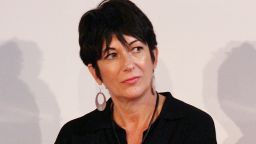Ghislaine Maxwell has not requested a plea deal, and prosecutors have not issued any plea offerings to the former Jeffrey Epstein associate in her sex trafficking case, federal prosecutor Alison Moe told a New York court Monday.
Maxwell is charged by New York federal prosecutors with conspiracy and enticing minors to travel to engage in illegal sex acts, and the transportation of minors to engage in criminal sexual activity for allegedly grooming and recruiting underage girls from 1994 through 1997.
She is also being charged with sex trafficking of a minor from 2001 to 2004, in addition to one count of sex trafficking conspiracy.
Maxwell attorney Bobbi Sternheim maintained Maxwell is not guilty of a crime to warrant a plea deal. Maxwell spoke at the hearing only to say, “I have not committed any crimes.”
Maxwell shuffled into the courtroom shackled at her hands and feet, wearing a baggy blue jumpsuit with a white long-sleeved shirt underneath. She wore brown large-framed reading glasses and shoulder-length black hair.
Maxwell smiled and blew a kiss over her mask to her sister, who returned the gesture. Maxwell’s sister sat in the public seating area for the duration of the nearly four-hour hearing and left the courthouse without speaking to the media.
Maxwell, who has been in federal custody for more than a year, was awoken at 3:45 a.m. in her cell and arrived at the federal courthouse at 5:38 a.m., where she stayed alone in a cold cell for hours and was given a small amount of food to eat with no utensils, her attorney said.
She was forced to climb into the transport van on her hands and knees because she was restricted by the shackles, Sternheim told the court.
Sternheim asked Judge Alison Nathan to arrange for later transport of Maxwell from the federal prison facility to the courthouse when the trial begins, saying the conditions for her client were terrible Monday.
Motions on trial evidence
Nathan reviewed more than 20 defense and prosecution motions, ruling from the bench what can and cannot be presented to the jury during the upcoming trial at the end of the month.
Nathan ruled the Florida investigation into Jeffrey Epstein and subsequent non-prosecution agreement are not admissible during the trial.
The judge also said the defense cannot call law enforcement agents as witnesses to ask them questions about the investigations or question the quality or thoroughness of the Southern District of New York’s investigation into Maxwell or the motives of her prosecution. Maxwell’s counsel maintains she was charged only because Epstein died.
The defense cannot present evidence or testimony implying Maxwell won previous civil litigation with victims in the case because there was no adjudication of the allegations and the litigation was voluntarily dismissed after a settlement, Nathan ruled.
The Epstein Victim Compensation Program will likely come up at trial, but the lawyers can’t imply that the settlement program gives the victims credibility in connection to allegations regarding Ghislaine Maxwell, the judge said.
Nathan also ruled the prosecution may refer to alleged victims as victims and minors during the trial, and certain witnesses will be referred to by pseudonyms or their first names in open court to protect their identities to the public, but the jury will be informed of their full names.
Message pads that allegedly have victim contact information written by Maxwell will be permitted as evidence, Nathan ruled preliminarily. A book in which prosecutors say Maxwell wrote lists of contact information for young female victims under the subject line “massage” was under debate and will likely be permitted.
Upcoming hearings
A hearing regarding one of the victims connected to the charges will be held in the coming days to address permissible testimony and other outstanding motions, along with a hearing to review the prosecution request to call an expert law enforcement witness at the trial.
The matters will likely be held on the same day this week or next. The parties were ordered to schedule that hearing by Tuesday.
Both parties have several briefings due November 2, 5 and 10.
Questionnaires will be passed out to prospective jurors beginning Thursday. They will see a brief recorded video of Nathan issuing instructions. A first round of questioning prospective jurors individually will occur November 16, a process the media will be permitted to see.
The final pool of 50 to 60 prospective jurors will share their Covid-19 vaccination status with the court for social-distancing planning, but it will not be factored into the jury selection.
The final examination of prospective jurors to empanel a jury likely will not occur until November 29, Nathan said.






